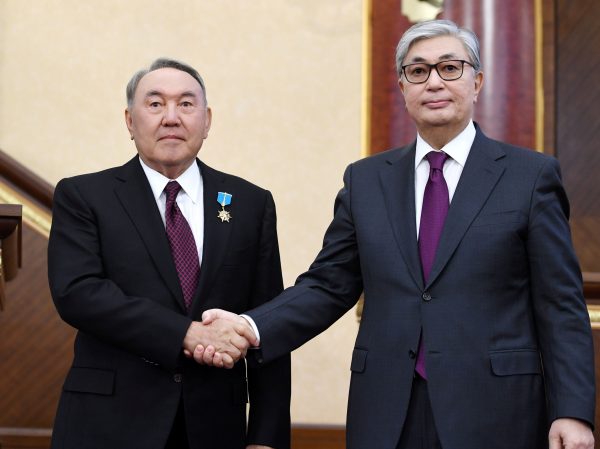Speaker of the Senate Kassym-Jomart Tokayev stepped in as acting president until elections are held some time before the current presidential term ends in April 2020. Tokayev, a close Nazarbayev ally, appears committed to maintaining the ‘soft authoritarian’ system created by Nazarbayev.
One of Tokayev’s first proposals was to rename the capital city Nursultan, a move quickly approved by parliament. He also appears determined to quell any hopes that the transition from Nazarbayev will be an opportunity for democratisation. Over two dozen protesters opposed to the capital city’s name change from Astana to Nursultan were arrested across the country.
Nazarbayev’s resignation indicates a desire for a smooth transition that ensures his family’s continued grip on power. Constitutional amendments introduced in 2010 make him ‘Leader of the Nation’ and protect him, his family and their property from civic or criminal prosecution. Later changes make Nazarbayev lifelong chairman of the National Security Council and leader of the ruling Nur Otan party. On 20 March 2019, Kazakhstan’s parliament elected Nazarbayev’s daughter Dariga as the new Chairwoman of the Senate — legally the second most powerful position in the country.
Nazarbayev is the first president in post-Soviet Central Asia to retire. The leaders of Uzbekistan and Turkmenistan died in office in 2016 and 2006 respectively, while two of Kyrgyzstan’s presidents were overthrown in popular uprisings in 2005 and 2010. Central Asia’s authoritarian leaders will consequently watch Kazakhstan’s unfolding situation with interest.
Nazarbayev’s resignation and the transfer of power already appears to be emulated in other parts of the region. Turkmenistan’s President Gurbanguly Berdimuhamedow and President Emomali Rahmon of Tajikistan amended their countries’ respective constitutions to extend or abolish term limits and place them in a position to maintain influence after they formally relinquish the presidency.
Six years after Nazarbayev became ‘Leader of the Nation’, Rahmon took the same title through amendments that abolished presidential term limits and rendered him immune from prosecution for life. Also in 2016, Turkmenistan’s parliament and Council of Elders approved constitutional amendments that removed the age limit for presidential candidates and extended presidential terms from five to seven years. Berdimuhamedow’s current term ends in 2024.
The leaders of Tajikistan and Turkmenistan are also, like Nazarbayev, establishing successors from within their families. Berdimuhamedow appointed his son Serdar deputy governor of Ahal province in January 2019. Serdar was previously deputy foreign minister and has been a parliamentary deputy since 2016.
In Tajikistan, Rahmom’s son — 31-year-old Rustam — appears to be being groomed for power. The 2016 constitutional amendments lowered the minimum age for presidential candidates to 30 years old, allowing Rustam to run from late 2017 onwards.
Rustam rose through the ranks of government quickly. He held senior positions in the Customs Service and the anti-corruption agency, and in January 2017 became mayor of the capital city, Dushanbe — all before he turned thirty. He is increasingly seen at his father’s side. Together they greeted foreign leaders attending the Commonwealth of Independent States Summit in Dushanbe in September 2018, and later jointly opened the Rogun dam, the centrepiece of Tajikistan’s development plan.
Both Rahmon and Berdimuhamedow rule over kleptocratic regimes that enrich their families. A 2012 investigation estimated that 80 per cent of revenues from projects implemented by the State Agency for the Management and Use of Hydrocarbon Resources in gas-rich Turkmenistan were diverted offshore. Talco, an aluminium smelter and Tajikistan’s largest industrial enterprise, is controlled by members of the president’s family through shell companies registered in the British Virgin Islands. Ensuring a smooth transition that protects ill-gotten wealth will remain a priority for Central Asia’s autocrats, and they will closely watch Nazarbayev’s attempt to do this.
While Tokayev and whoever becomes Kazakhstan’s new president will likely continue its ‘multi-vector’ foreign policy — pursuing partnerships with external powers without becoming dependent on any of them — Kazakhstan’s role as the region’s leading power may now be under threat. Nazarbayev was a towering figure in Central Asia: the region’s last Soviet-era leader and generally viewed as its most competent statesman. His successor may struggle to emulate this role.
Shavkat Mirziyoyev, who became president of Uzbekistan following the death of Islam Karimov in 2016, is already re-positioning his country as a pivotal actor in the region. Breaking with the isolation and animosity of Karimov’s era, he rebuilt ties with Uzbekistan’s neighbours by re-opening borders, boosting regional trade, hosting regional conferences and attracting external investment. With Nazarbayev’s retirement, Mirziyoyev’s regional profile will likely continue to rise, with Uzbekistan — the region’s most populous state — emerging as Central Asia’s leading power.
Edward Lemon is DMGS-Kennan Institute Fellow at the Daniel Morgan Graduate School of National Security in Washington DC. In his research, he examines authoritarianism, extremism and international relations in Central Asia.

